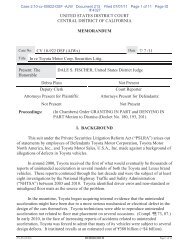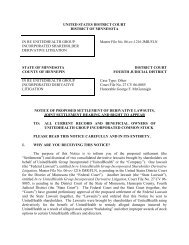to view the Lawdragon's - Bernstein Litowitz Berger & Grossmann LLP
to view the Lawdragon's - Bernstein Litowitz Berger & Grossmann LLP
to view the Lawdragon's - Bernstein Litowitz Berger & Grossmann LLP
You also want an ePaper? Increase the reach of your titles
YUMPU automatically turns print PDFs into web optimized ePapers that Google loves.
“ Tr i a l s d e a l w i t h f a c t s a n dt h e t e s t i m o n y o f w i t n e s s e s .T h i s i s b e t t e r t h a n a c l i m a t ew i t h o u t t r i a l s . ”– Natasa Kandicproceedings and can res<strong>to</strong>re trust and develop skills innational justice systems. Writing in 2009 about <strong>the</strong> ICTY’scompletion strategy, <strong>the</strong>n-President of <strong>the</strong> ICTY Faus<strong>to</strong>Pocar said that “primacy” and “complementarity” wereactually “two sides of <strong>the</strong> same coin” – <strong>the</strong> ICTY hadassumed jurisdiction over cases because of <strong>the</strong> inabilityof national courts <strong>to</strong> do so, and now <strong>the</strong> tribunal couldsend cases back <strong>to</strong> <strong>the</strong>ir rightful jurisdictions. (This putsa somewhat positive spin on <strong>the</strong> motivations behindcompletion strategy, which was also hastened by concernsabout <strong>the</strong> costs of international tribunals.)Seen this way, <strong>the</strong> mix of international and domesticcases that have emerged in response <strong>to</strong> war crimes in <strong>the</strong>former Yugoslavia may suggest tandem responses <strong>to</strong> futureatrocities falling under <strong>the</strong> jurisdiction of <strong>the</strong> Rome Statute.The ICC may need <strong>to</strong> exercise jurisdiction in particularlyunstable situations, but both <strong>the</strong> court and internationalcommunity at large will expect domestic courts <strong>to</strong> beginprocessing cases as soon as possible. For those who favorprosecutions after conflicts, this may be crucial <strong>to</strong> filljustice gaps left by international tribunals, as <strong>the</strong> ICC hastended <strong>to</strong> target only a handful or so of high-level suspectsin its early cases. The experience of <strong>the</strong> former Yugoslaviais also likely relevant <strong>to</strong> accountability efforts that do notinvolve any international cases, but where domestic courtsneed significant international assistance. In a presentationlast year, David Tolbert, <strong>the</strong> president of <strong>the</strong> InternationalCenter for Transitional Justice, said that <strong>the</strong> future ofinternational justice would rely on “nationally-based courtswhich utilize <strong>the</strong> support and expertise of internationalexperts,” with a focus on capacity building.Serbia’s experience provides an opportunity <strong>to</strong> evaluatesuch relationships between international and domesticinstitutions. The domestic system has clearly performed wellunder certain principles of complementarity. Most sourcesagree that <strong>the</strong> war crimes effort has streng<strong>the</strong>ned Serbia’sjustice system. Jovanovic said that <strong>the</strong> skills associated withcomplex cross-border war crimes cases have been put <strong>to</strong>use in o<strong>the</strong>r criminal matters. The cases have begun <strong>to</strong> filljustice gaps by prosecuting individuals un<strong>to</strong>uched by <strong>the</strong>ICTY, however much that effort remains a work in process.Vukcevic said <strong>the</strong> improvement of <strong>the</strong> "national justice systemis an undeniable fact."Public opinion polls conducted by <strong>the</strong> OSCE andpartnering organizations in recent years also show that<strong>the</strong> domestic system enjoys greater legitimacy in Serbiathan <strong>the</strong> ICTY. Granted, <strong>the</strong> bar was extremely low: Inresults from <strong>the</strong> 2009 poll, 78 percent of Serbs had a verynegative or mostly negative <strong>view</strong> of <strong>the</strong>ICTY (while majorities of Albanian andBosniak citizens in Serbia had positive<strong>view</strong>s). The domestic system has notnecessarily received glowing re<strong>view</strong>s.In surveys from recent years, only abouta third of <strong>the</strong> respondents believed that<strong>the</strong> prosecu<strong>to</strong>r’s office had <strong>the</strong> courage <strong>to</strong> prosecute highrankingstate officials, and a quarter or less have believedthat prosecu<strong>to</strong>rs and judges act independently of pressurefrom state authorities and <strong>the</strong> public.Still, only 8 percent from <strong>the</strong> 2009 survey believedthat <strong>the</strong> point of <strong>the</strong> domestic system is <strong>to</strong> “place guilt ofwartime sufferings on <strong>the</strong> Serbs.” That report concludedthat, when finding Serbs guilty, respondents believedthat “<strong>the</strong> court reached <strong>the</strong> decision solely on basis ofevidence and hence accept what has been determined,”though <strong>the</strong> percentage holding that opinion dippedfrom 57 <strong>to</strong> 50 percent between <strong>the</strong> 2009 and 2011 polls.The sizeable acceptance of case results involving Serbswould seem <strong>to</strong> constitute a notable achievement.Yet transitional justice efforts are intended <strong>to</strong> contribute<strong>to</strong> more transformative goals related <strong>to</strong> <strong>the</strong> long-termhealth of a society or region. The most cherished goal,reconciliation, is also <strong>the</strong> most fraught with complexity:It can mean individual victim-<strong>to</strong>-perpetra<strong>to</strong>r forgivenessor improved trust and peaceful co-existence betweenpreviously combative ethnic groups or political parties,among o<strong>the</strong>r interpretations. In inter<strong>view</strong>s at The Hagueand in <strong>the</strong> former Yugoslavia, <strong>the</strong> most common <strong>the</strong>me<strong>to</strong> emerge regarding transitional justice was that <strong>the</strong>processes of reconciliation can last decades or longer, andstill may never reach satisfying conclusions for <strong>the</strong> wartimegeneration. The anticipated benefits of “reconciliation”were <strong>to</strong>ssed around ra<strong>the</strong>r easily during <strong>the</strong> early yearsof <strong>the</strong> ICTY, burdening <strong>the</strong> institution with enormousexpectations that led <strong>to</strong> disappointment among itssupporters and constituencies.Skeptics of punitive approaches do not limit <strong>the</strong>ircriticisms <strong>to</strong> <strong>the</strong> ICTY or international tribunals generally.Indeed, many lament <strong>the</strong> emerging consensus over aninterpretation of complementarity that requires ICC states<strong>to</strong> prosecute offenders at home, when truth commissionsand o<strong>the</strong>r locally developed mechanisms might be moreconstructive while also satisfying <strong>the</strong> ICC’s desire <strong>to</strong> endimpunity. A widely shared <strong>view</strong> is that truth commissionswill almost always have a better chance at establishing<strong>the</strong> his<strong>to</strong>rical causes and full range of crimes and victimexperiences of any given conflict or period of oppression;trials are necessarily narrow by focusing on individuals,however well <strong>the</strong> crimes are contextualized.Serbia has yet <strong>to</strong> benefit from such a truth initiative.Kostunica, with questionable motivations, attempted<strong>to</strong> form a truth commission in 2001 whose compositionwas not considered credible and <strong>the</strong> process died beforeL A W D R A G O N 50 I s s u e 13
















